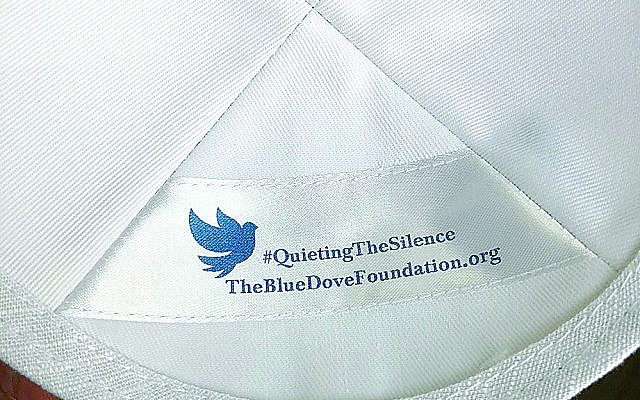Stigma Shames People Into Silence
Justin Milrad is the co-founder of The Blue Dove Foundation.
Justin Milrad is the CEO of The Berman Center.

Let’s take a second and look inward, at our community, and at our families. Is there something that’s happening that we don’t want to talk about? Something that we don’t feel good about, something that could make us feel ashamed? Over the last year in Atlanta, the Blue Dove Foundation has seen more transformative dialogue about our struggles. In fact, after discussions with multiple practitioners and rabbis, anecdotally people are starting to have conversations that they likely wouldn’t have had a year ago.
We recently received an email from a rabbi who, over Yom Kippur, spoke about mental health, suicide and addiction prior to making a special mishaberach for those who are or have struggled. He wore the Blue Dove kippah that signifies “raising awareness” and “creating safe spaces” for those who are struggling, otherwise known as Kippot for Change, www.blue-dove-foundation.myshopify.com.
“For the first time in 23 years, people came up to me and shared with me mental health and addiction issues as well as speaking about overdose deaths of children and family.” By hearing the rabbi speak on this controversial topic, his congregants instantly knew that the topic could be discussed openly.
So the lesson learned over the last year is that although many are suffering silently, our community is open, willing, able and ready to begin having conversations.
Perhaps we are erroneously allowing our own shame and stigma to force us to suffer alone, when in fact, our community has shown its readiness to listen, support, and help. Let’s open up the discussion about our teens.
Parents often wonder whether their child is acting like a normal teenager or behaving differently due to mental illness, drug use or behavioral difficulties. It’s pretty normal for teenagers to be moody because of hormonal, physical and brain development changes that accompany puberty.
Our kids are growing up in a period of hyper connectivity, programming and pressure. Balancing the stresses of life (school, extra-curricular, social/emotional, social media, sports, family, etc.) is extremely challenging. As parents, grandparents, educators, friends, family, it may be difficult to differentiate “normal teenage behavior” from the symptoms of depression, anxiety and other emotional difficulties.
It is important to know more about our kids, the data and how we can strengthen the relationship and connection. Adolescence is a critical time for mental health promotion, prevention, early identification and effective treatment.

Here are the facts:
- 31.9% of adolescents ages 13 to 19 have an anxiety disorder and of those, 8.3% have severe impairment.
- The prevalence of any anxiety disorder among adolescents is higher for females (38 percent) than for males (26.1 percent).
- Depression affects nearly one in eight adolescents and young adults each year.
- About 1 in 5 youth aged 13 to 18 (21.4 percent) experiences a severe mental disorder at some point during their life.
- Half of all chronic mental illness begins by age 14; three-quarters by age 24.
- Despite effective treatment, there are long delays – sometimes decades – between the first appearance of symptoms and when people get help.
- Suicide is the 10th-leading cause of death in the U.S., the third-leading cause of death for people aged 10 to 14 and the second-leading cause of death for people aged 15 to 24.
On Oct. 11, from 7 to 9 p.m. at Congregation B’nai Torah in Sandy Springs, The Blue Dove Foundation is hosting a night filled with mental health and substance use education, awareness and prevention for adolescents and their families in partnership with B’nai Torah; Jewish Family & Career Services/HAMSA; Atlanta Jewish Academy; The Epstein School; The Davis Academy; The Weber School; In the City Camp; JumpSpark; Creating Connected Communities; the Jewish Federation of Greater Atlanta; Derech Transitional Living; Jewish Pathways to Recovery; and The Berman Center. Four speakers will tell their stories of their struggles and recovery.
The premise of the event is to “Quiet the Silence,” begin to communicate and ask for help, if needed.
While the program is geared to parents and their teens, eighth grade and older, the event is open to all adults with or without teens. #QuietTheSilence.



comments